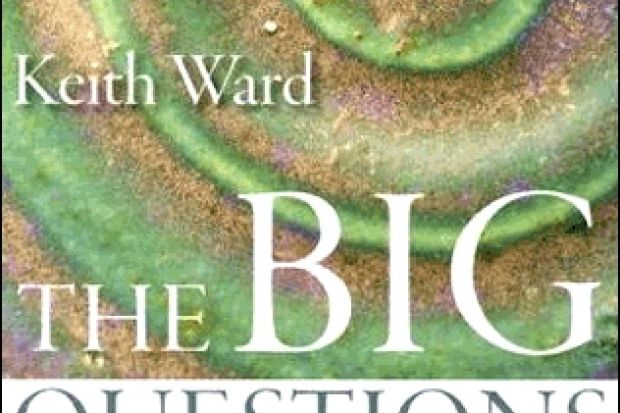Anyone curious about the interrelationship between science and religion would be well advised to put this book at the top of their reading list. Keith Ward has succeeded where many others have not in producing a first-rate text that gets to the heart of many of the questions troubling the dialogue between science and religion. Moreover, his exposition of the scientific concepts achieves a rare clarity combined with depth.
The primary interests driving his argument are the philosophical questions behind the dialogue, so those areas of discussion outside this remit fall away from view. He is, therefore, faithful to the title of the book in presenting what he believes are the big questions at stake, resulting in a text that is not only deeply engaging but also of significance for many of those concerned with these topics. The range that the book covers in both scientific and religious terms is impressive. A structure that lays out key philosophical questions, with sub-questions that draw out specific religious issues, is helpful in as much as it shows the focus for each chapter, while helping to ground the discussion. There is also a logic to the way the large questions are asked, ranging from considerations of the universe as a whole to the evolutionary history of life, the nature of space and time and the human person with regard to soul, truth, morality and religious beliefs.
Ward writes with fluency and rigour. His attention to the classics helps to position his arguments within a tradition of thought that will appeal particularly to those in the humanities. His representation of scientific research is well informed, the fruit of years of conversations with experts and background research across a broad range of sciences. Ward's own biography comes to the surface in this book in a striking way, as he is prepared to consider sceptical views from both religious and scientific viewpoints. Any hint of naive presuppositions in those views, from either faith in religious belief or science, comes to the surface.
Woven into the discussion are diverse religious traditions, from Buddhism and Hinduism to Judaism, Christianity and Islam. Nonetheless, Ward's background as an Anglican priest also shows through, in as much as he probes aspects of Christian doctrine that are relevant to the questions he addresses, such as its more traditional teaching on creation, salvation, the soul and hell. Academic theologians engaged in rethinking these topics will not generally find their research represented and in this respect the treatment of key doctrines might seem less than satisfactory. Key developments in contextual and constructive theologies, for example, are not discussed. But those engaged in such topics should not be too hasty to criticise Ward, for his book is dealing with what he considers the most common representations of that tradition. It would take further sociological research to work out to what extent the concepts of, for example, God and salvation that Ward represents are comprehensive in terms of their diversity and persistence. Much the same comment applies to the other religious traditions discussed.
The book is also ambitious in as much as Ward seeks to explore critical philosophical issues in the debate, almost in spite of the particular sciences that pertain. Sometimes his enthusiasm in making a philosophical point clouds the discussion. For example, in his summary of the debate between Simon Conway Morris and Stephen Jay Gould regarding evolution, the constraints discussed by Conway Morris go rather further than those constraints of physics and chemistry in the way that Ward suggests, and Gould's view is not quite the "freak accident" implied in Ward's summary, even if some of Gould's earlier work pointed in this direction. Ward also treats intelligent design well, probing the philosophy for and against such arguments, but his affirmation of intelligent design in a general sense may be somewhat ill-advised, given that it could lend itself to misinterpretation.
In spite of these difficulties, this book will be an excellent resource for those who are searching for answers to difficult questions that surface in the debate. It should, for example, be required reading alongside any course that advocates the views of Richard Dawkins, although Ward's discussion ranges far wider than discussion of Dawkins's own inappropriate treatment of religious and philosophical issues. Concerns such as belief in miracles are treated with great alacrity, probing behind even Hume's sceptical answer to reveal Hume's own naive understanding of science and religious belief.
Ward also returns to the age-old question of freedom of choice, and asks some difficult questions about whether a standard modern answer couched in terms of the indeterminacy of physics is sufficient. This leaves an open space for religious talk while being aware and fully conscious of both the philosophical basis for and scientific arguments behind the meaning of rational agency.
Such talk flows into a discussion about the nature of personhood and the soul, which in turn underlies questions about the possibility of an afterlife. Here, Ward takes us on a tour of Aquinas's considerations of the soul, which still has relevance. Other difficult questions, such as whether science is value-free, are important reading for those with a scientific background, in that it serves to illuminate many of the myths through which much science has, at least in the past, sought to recommend itself.
His conclusion that both science and religion need to be "moderated" by due attention to morality and his argument that there are objective values "that can be apprehended in and through ordinary experience" is bold in the contemporary climate of postmodern scepticism. He also considers carefully the alternative in a further chapter - namely, that science can provide a naturalistic explanation for morality and religious belief. His discussion encounters here the murky waters of sociobiology that has generated so much debate in recent years.
Ward correctly notes in concluding that any claim for religious experience of the Spirit is beyond scientific investigation. Yet he refuses to let this have the last word, for underneath such claims lies a materialism that rests on its own assumptions. In the end we are left with a choice for or against the sufficiency of science. In this sense, Ward invites the reader to probe such questions. Overall this is a text that deserves to be widely read, both by those entering the field, and by those already attached to certain questions and areas of exploration.
THE AUTHOR
Divine intervention keeps putting paid to Keith Ward's ambition of becoming a fiction writer. "I have tried to write a novel," he says, "but it always turns into another book about God."
With more than 20 books on theology to his credit, Ward has an international reputation as an expert in comparative theology and the interplay between science and faith.
One of the main focuses of his work is the dialogue between religious traditions, an interest that led to his becoming joint president of the World Congress of Faiths in 1992-2001. He explores concepts of God and the idea of revelation. He has been critical of materialist philosophers of consciousness and social scientists, saying they each reduce the human person to aspects of their own discipline.
Ward has not been afraid to challenge aspects of Christianity, notably fundamentalism. He says fundamentalists interpret the Bible in an implausible way, choosing which passages to emphasise to fit pre-existing beliefs, and he argues that the Bible must be taken seriously but not always literally.
Ward graduated in 1962 from the University of Wales, going on to lecture in logic at the University of Glasgow. He then earned a BLitt from Linacre College, Oxford. From there he moved to St Andrews to lecture in philosophy. In 1971, he became lecturer in the philosophy of religion at the University of London, and was ordained as a priest in the Church of England. From 1975 to 1983 he was dean of Trinity Hall, Cambridge. He has held professorial posts at the University of London, King's College London and Oxford, and visiting roles at Claremont Graduate University, Drake University and the University of Tulsa. He is currently Gresham Professor of Divinity at Gresham College, London.
When he is not pursuing academic ideas or not writing his novel, he can be found walking, and he claims to have walked most of Britain's long-distance paths. He is also a keen musician, although, he says, not an accomplished one. "I am a failed concert pianist, and now play only for my own satisfaction."
- Sarah Cunnane
The Big Questions in Science and Religion
By Keith Ward
Templeton Foundation Press
288pp, £9.99
ISBN 9781599471358
Published 1 June 2008
Register to continue
Why register?
- Registration is free and only takes a moment
- Once registered, you can read 3 articles a month
- Sign up for our newsletter
Subscribe
Or subscribe for unlimited access to:
- Unlimited access to news, views, insights & reviews
- Digital editions
- Digital access to THE’s university and college rankings analysis
Already registered or a current subscriber?




